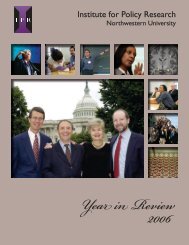Whatever Happened to the Emerging Democratic Majority?
Whatever Happened to the Emerging Democratic Majority?
Whatever Happened to the Emerging Democratic Majority?
You also want an ePaper? Increase the reach of your titles
YUMPU automatically turns print PDFs into web optimized ePapers that Google loves.
IPR Working Papers 2000-2005<br />
WP6<br />
Farewell <strong>to</strong> Maternalism? State Policies and Mo<strong>the</strong>rs’ Employment<br />
(WP-05-10)<br />
Ann Shola Orloff, Sociology and Institute for Policy Research, Northwestern University<br />
Across <strong>the</strong> rich, developed democracies of Western Europe, North America, and <strong>the</strong> Antipodes, we are in <strong>the</strong> midst of<br />
changes in gendered policy logics from supporting women as full-time caregivers <strong>to</strong> requiring and supporting employment<br />
for all, or a series of “farewells <strong>to</strong> maternalism.” Whe<strong>the</strong>r <strong>the</strong>se changes are “women-friendly”— for some or all<br />
women—depends very much on how state support for caregiving activities and employment is configured. This paper<br />
analyzes <strong>the</strong> politics and policies surrounding <strong>the</strong> “farewell <strong>to</strong> maternalism.” First, I will briefly examine <strong>the</strong> social policies<br />
and politics that have been recently described as “maternalist,” and <strong>the</strong> predominant gendered divisions of labor and patterns<br />
of family and household formation that <strong>the</strong>y depended upon and reinforced, for it is against <strong>the</strong>se backdrops that<br />
current changes are occurring. Next, I take up <strong>the</strong> politics and policies that have moved Sweden and <strong>the</strong> U.S. away from<br />
maternalism and <strong>to</strong>wards support for women’s employment, from supporting women’s claims as mo<strong>the</strong>rs <strong>to</strong> supporting<br />
women’s claims as workers or citizens and sometimes also caregivers. I close with some consideration about <strong>the</strong> potential<br />
for <strong>the</strong> emergence of new models in continental Europe, and whe<strong>the</strong>r it might be possible <strong>to</strong> imagine a situation incorporating<br />
higher levels of women’s employment with less displacement of family care <strong>to</strong> ei<strong>the</strong>r market or state services.<br />
Depending on each country’s starting point, different strategies may be pursued <strong>to</strong> enhance women’s employment, while<br />
reducing poverty and economic vulnerability, and ensuring that caregiving activities are supported. Supporting mo<strong>the</strong>rs’<br />
employment presents a challenge not only politically and culturally, but also in terms of state capacities. The ultimate—though<br />
possibly u<strong>to</strong>pian—solution <strong>to</strong> <strong>the</strong> problems of reconciling employment and care and women’s economic dependency in<br />
all systems may be a “universal caregiver” model: <strong>to</strong> induce “men <strong>to</strong> become more like what most women are now—that<br />
is, people who do primary care work” (Fraser1994, p. 611).<br />
Examining Gender Gaps in Sociopolitical Attitudes: It’s Not Mars and Venus<br />
(WP-05-11)<br />
Alice H. Eagly, Psychology and Institute for Policy Research, Northwestern University<br />
Amanda B. Diekman, Psychology, Miami University<br />
This paper investigates a robust, important, and fairly recent phenomenon: Women as members of <strong>the</strong> body politic think and<br />
vote differently than men. Despite frequent discussion of <strong>the</strong>se phenomena in <strong>the</strong> press, gender has remained surprisingly<br />
underanalyzed in political psychology. Moving beyond <strong>the</strong> stereotypical interpretations often seized upon by <strong>the</strong> media,<br />
we present a feminist analysis by invoking <strong>the</strong> social positioning of women and men as <strong>the</strong> origin of <strong>the</strong> differing political<br />
stances of women and men. From our perspective, gender gaps in attitudes and behavior are shaped by <strong>the</strong> divergence<br />
of women’s interests from those of men; in turn, <strong>the</strong>se divergent interests derive from <strong>the</strong> gender division of labor.<br />
Of Men, Women, and Motivation: A Role Congruity Account<br />
(WP-05-12)<br />
Alice H. Eagly, Psychology and Institute for Policy Research, Northwestern University<br />
Amanda B. Diekman, Psychology, Miami University<br />
To <strong>the</strong> extent that <strong>the</strong> sexes typically occupy different social roles, <strong>the</strong>se roles frame individual opportunities in ways that<br />
foster differences in motivations and different methods of fulfilling those motivations. From <strong>the</strong> role congruity perspective,<br />
<strong>the</strong> motivation <strong>to</strong> achieve role congruity—<strong>to</strong> align behavior with <strong>the</strong> demands of roles—is an important force. Our<br />
role congruity account of sex differences and similarities in motivation focuses on how roles influence <strong>the</strong> goals and<br />
methods of goal pursuit elected by men and women. First, we examine support for <strong>the</strong> idea that role congruity yields<br />
various positive effects. Next, we examine <strong>the</strong> mechanisms by which placement in different roles might foster differences<br />
in motivation. Finally, we examine evidence documenting role-congruous motivational orientations, specifically “agency”<br />
for men and “communion” for women. In general, we find that fitting important social roles is a critical motivational<br />
force, and <strong>the</strong> opportunities for goal pursuit afforded by <strong>the</strong>se social roles shape <strong>the</strong> kinds of goals and methods of goal<br />
pursuit elected by individuals.
















